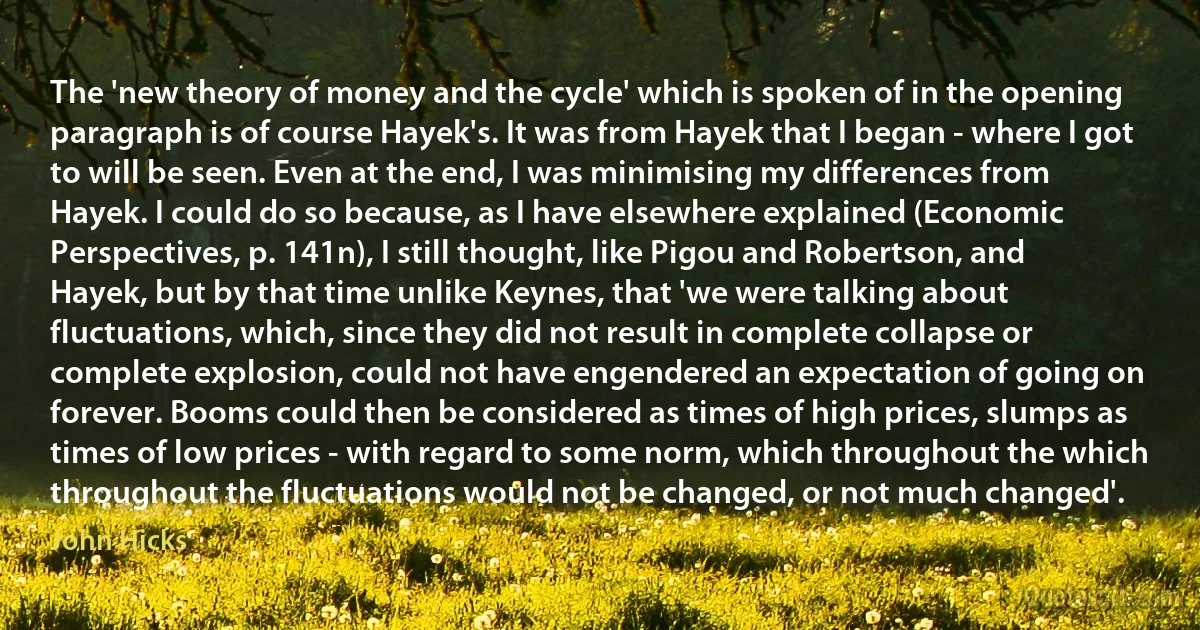
The 'new theory of money and the cycle' which is spoken of in the opening paragraph is of course Hayek's. It was from Hayek that I began - where I got to will be seen. Even at the end, I was minimising my differences from Hayek. I could do so because, as I have elsewhere explained (Economic Perspectives, p. 141n), I still thought, like Pigou and Robertson, and Hayek, but by that time unlike Keynes, that 'we were talking about fluctuations, which, since they did not result in complete collapse or complete explosion, could not have engendered an expectation of going on forever. Booms could then be considered as times of high prices, slumps as times of low prices - with regard to some norm, which throughout the which throughout the fluctuations would not be changed, or not much changed'.
John HicksRelated topics
begin course cycle elsewhere end forever high low money norm paragraph result seen speak talking thought times time keynes hayek robertsonRelated quotes
WHAT HAPPENS AFTER DEATH?
When a human soul goes out of the body, some great mystery happens. For if it is guilty of sins, then there come hordes of demons, evil angels and dark forces, take that soul and drag it to their side.
No one should be surprised at that, because if a man surrendered and fell prey to them while still alive in this world, will not they have even greater control over him and enslave him when he departs from this world?
As for the other, the better part of people, something different happens to them. There are Angels around the holy servants of God in this life; the holy spirits surround them and protect them; and when their souls are separated from the body, the choir of Angels welcomes them into their fellowship, into a bright life, and thus leads them to the Lord.

Macarius of Egypt
What theory can we use to get us out of the impending slump quickly and reliably? To use the 'new classical' theory of fluctuations begun at Chicago in the 1970s – the theory in which the "risk management" models are embedded – is unthinkable, since it is precisely the theory falsified by the asset price collapse. The thoughts of some have turned to John Maynard Keynes. His insights into uncertainty and speculation were deep. Yet his employment theory was problematic and the 'Keynesian' policy solutions are questionable at best.... At the end of his life Keynes wrote of 'modernist stuff, gone wrong and turned sour and silly'. He told his friend Friedrich Hayek he intended to re-examine his theory in his next book. He would have moved on. The admiration we all have for Keynes's fabulous contributions should not sway us from moving on.

Edmund Phelps
It was found [in the 1970s], unexpectedly and without anyone really having a concept for it, that the rules of perturbation theory can be changed in a way that makes relativistic quantum gravity inevitable rather than impossible. The change is made by replacing point particles by strings. Then Feynman graphs are replaced by Riemann surfaces, which are smooth - unlike the graphs, which have singularities at interaction vertices. The Riemann surfaces can degenerate to graphs in many different ways. In field theory, the interactions occur at the vertices of a Feynman graph. By contrast, in string theory, the interaction is encoded globally, in the topology of a Riemann surface, any small piece of which is like any other. This is reminiscent of how non-linearities are encoded globally in twistor theory.

Edward Witten
Comets are flying around the solar system. As they near the sun, they develop a tail as material is blown off by the solar wind. Most astronomers agree that comets cannot be more than 10,000 years old. They would have completely disappeared by now. Some scientists have recognized this as a serious problem for the theory that the earth is billions of years old, so they have proposed a new theory that new comets are constantly being introduced into the solar system to replace the old ones that burn out. They say they are coming from the "Oort Cloud.” No one has ever seen this Oort cloud, Oort never saw the Oort cloud! There is NO scientific evidence for its existence, but in their mind, this answers the serious problem the short lives of comets creates. There is a simpler answer, of course: the universe is NOT billions of years old!

Kent Hovind
I will give you another scripture, Jer. 46. 27, 28 - out of which the Lord shewed me what he would do for me and the rest of his servants. - But after he was pleased to reveal himself to me . . . Ever since that time I have been confident of what he hath revealed unto me. . . Therefore I desire you to look to it, for you see this scripture fulfilled this day and therefore I desire you that as you tender the Lord and the church and commonwealth to consider and look what you do. You have power over my body but the Lord Jesus hath power over my body and soul, and assure yourselves thus much, you do as much as in you lies to put the Lord Jesus Christ from you, and if you go on in this course you begin you will I bring a curse upon you and your posterity, and the mouth of the Lord hath spoken it. . .

Anne Hutchinson
